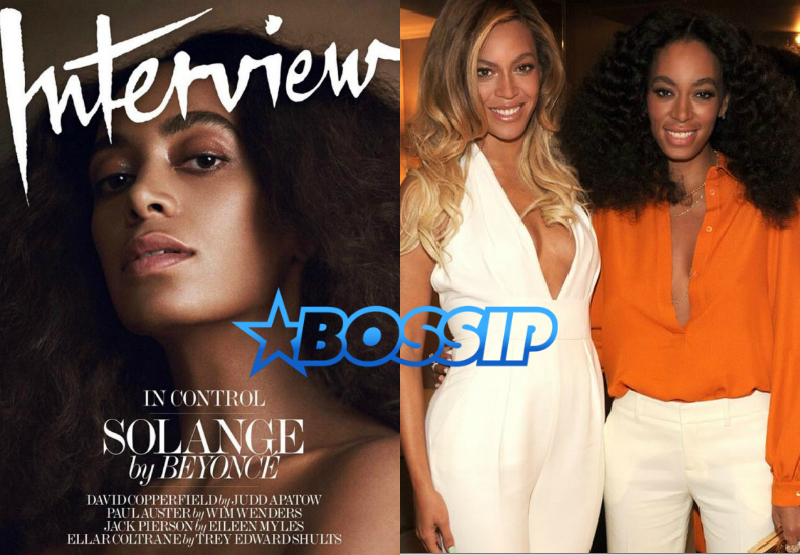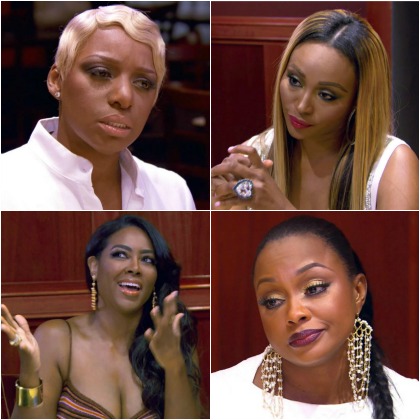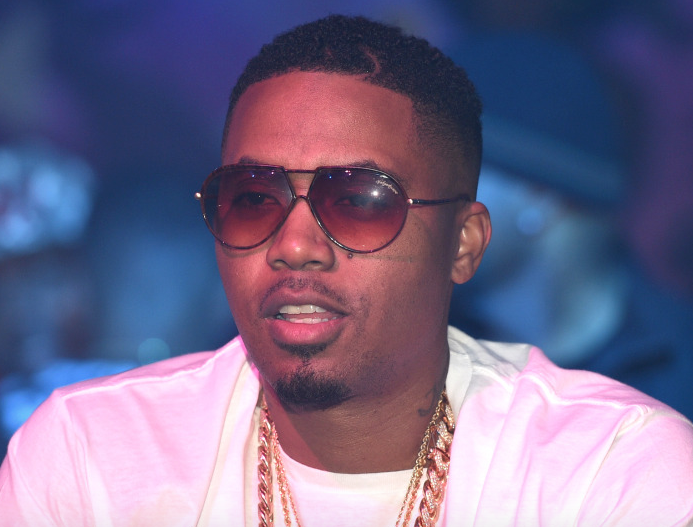Beyoncé Interviews Solange For Interview Magazine
Solange had one helluva 2016. Her lauded melanin-drenched album, A Seat At The Table, has healed, invigorated, baptized, and fortified black folks, ESPECIALLY black women, in a way that no other album has in quite some time.
Tying a nice bow around her breakout year comes an intimate and in-depth interview in Interview Magazine with her big sister Beyoncé.
https://instagram.com/p/BPFwSibgwQ3/
Here are the Knowles’ ladies discussing everybody’s favorite ASATT jam, “Cranes In The Sky”:
BEYONCÉ: What does the song title “Cranes in the Sky” mean?
SOLANGE: “Cranes in the Sky” is actually a song that I wrote eight years ago. It’s the only song on the album that I wrote independently of the record, and it was a really rough time. I know you remember that time. I was just coming out of my relationship with Julez’s father. We were junior high school sweethearts, and so much of your identity in junior high is built on who you’re with. You see the world through the lens of how you identify and have been identified at that time. So I really had to take a look at myself, outside of being a mother and a wife, and internalize all of these emotions that I had been feeling through that transition. I was working through a lot of challenges at every angle of my life, and a lot of self-doubt, a lot of pity-partying. And I think every woman in her twenties has been there—where it feels like no matter what you are doing to fight through the thing that is holding you back, nothing can fill that void. I used to write and record a lot in Miami during that time, when there was a real estate boom in America, and developers were developing all of this new property. There was a new condo going up every ten feet. You recorded a lot there as well, and I think we experienced Miami as a place of refuge and peace. We weren’t out there wilin’ out and partying. I remember looking up and seeing all of these cranes in the sky. They were so heavy and such an eyesore, and not what I identified with peace and refuge. I remember thinking of it as an analogy for my transition—this idea of building up, up, up that was going on in our country at the time, all of this excessive building, and not really dealing with what was in front of us. And we all know how that ended. That crashed and burned. It was a catastrophe. And that line came to me because it felt so indicative of what was going on in my life as well. And, eight years later, it’s really interesting that now, here we are again, not seeing what’s happening in our country, not wanting to put into perspective all of these ugly things that are staring us in the face.
On the next page Solange talks about the ratchet reality TV show that she watches religiously…
Image via Interview/WENN
BEYONCÉ: What makes you laugh the hardest?
SOLANGE: The Real Housewives of Atlanta, hands-down.
BEYONCÉ: Really?! I didn’t know that.
SOLANGE: I watch it religiously, and I am in stitches the whole time.
The RHOA are gonna LOVE that lol.
On the next page Beyoncé reveals which rapper had Solange “crying and acting a fool” when she was introduced to him…
BEYONCÉ: One of my proudest moments as a sister was when I was able to introduce you to your hero, Nas, and you cried and acted a fool. I was so surprised that Mrs. Too-cool-for-everything was acting a fool. Is there another human being that would get that reaction out of you now if you met him/her?
SOLANGE: Diana Ross. For sure. I broke out in some hives when I went to her concert. Alan was like, “Uh, you’re breaking out into hives. Calm down.”
Flip it again to read Solange’s thoughts on the similarities between daddy Matty Knowles and Master P…
BEYONCÉ: Well, it brought tears to my eyes to hear both of our parents speak openly about some of their experiences. And what made you choose Master P to speak on the album?
SOLANGE: Well, I find a lot of similarities in Master P and our dad.
BEYONCÉ: Me, too. [laughs]
SOLANGE: One of the things that was really, really deep for me in talking to Dad is his experience of having the community choose you [as one of the first students to integrate his Southern elementary and junior high school]—to do that, to go out and be the warrior and the face of that is just such an incredible amount of pressure. And to evolve from that and still have your sense of independence and still have your stride and your strength, and to dream big enough that you can create something from the ground up bigger than any community, neighborhood, or those four corners … I remember reading or hearing things about Master P that reminded me so much of Dad growing up. And they also have an incredible amount of love and respect for one another. And I wanted a voice throughout the record that represented empowerment and independence, the voice of someone who never gave in, even when it was easy to lose sight of everything that he built, someone invested in black people, invested in our community and our storytelling, in empowering his people. You and I were raised being told not to take the first thing that came our way, to build our own platforms, our own spaces, if they weren’t available to us. And I think that he is such a powerful example of that.
On the last page the ladies discuss Solange’s creative process and her biggest inspiration for producing the music for A Seat At The Table…
BEYONCÉ: It was a three-year process to create A Seat at the Table. You took your time, and it’s still so fascinating to me the amount of production you did for this album, the live instrumentation, with you physically, on the keyboards, on the drums, producing not only the vocals but also co-producing the tracks. It’s something to be celebrated, for a young woman to be such a strong producer as well as a singer-songwriter and artist.
SOLANGE: Thank you! One of my biggest inspirations in terms of female producers is Missy. I remember seeing her when you guys worked together and being enamored with the idea that I could use myself as more than a voice and the words. On my previous records, I contributed to production here and there, but I was always really afraid to really get in there and … I guess I wasn’t really afraid, I was just really comfortable writing the songs. I felt like my contributions as a producer were enough. But when I started to work on the sonics for this record, I realized that I had to create such a very specific sonic landscape in telling the story. I had these jam sessions, and there were holes that no one else could really fill for me. It really came out of a need for something outside of what I could articulate and lead someone else to do. And it was scary. It was really scary, and a lot of times I was frustrated with myself and feeling insecure because it was new to operate in that space and be in front of people at this age, learning something on this level. But I feel so grateful and excited that there’s a new phase that I conquered as an artist.
What do you think? How did y’all’s lord and savior do as an interviewer?
Continue Slideshow
-

Frames Per Second Podcast: Zendaya, Timothée Chalamet & More — Who’s The Future of Hollywood?
-

'Palm Royale' Exclusive: Amber Chardae Robinson On Playing Black Feminist In Series Set In 1969, 'Not Much Has Changed For Women'
-

Who Looked More Bangin'? The Best Dressed Looks From The 2024 NAACP Image Awards Red Carpet
-

Megan Thee Stallion Presents At Crunchyroll Anime Awards 2024, Stuns In Skintight Leather 'JoJo's Bizarre Adventure' Look
-

Checks Over Stripes? Kanye West Spotted In Nike At Milan Fashion Week
-

Texas Hold 'Em: 6 Times Beyoncé Reminded Us She's A Country Queen
-

Bad & Boujee: Our Hollywood Faves Dripped Decadently For The Academy Museum Gala
-

Balenci Bardi: Cardi B Makes Her Debut On The Catwalk For Balenciaga Fall '24 Show





Comments
Bossip Comment Policy
Please read our Comment Policy before commenting.